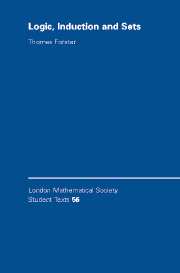8 - Set theory
Published online by Cambridge University Press: 05 June 2012
Summary
Set theory is the first-order theory of equality and one extensional binary relation, and its importance in twentieth-century mathematics arises from the fact that any mathematical language can be interpreted in it, with varying felicitousness. In this respect it is a bit like graph theory. Graph theory is the theory of equality and one irreflexive symmetrical relation, and it is important because graphs are a useful data structure: things describable as graphs crop up all over the place. Set theory is more general still: not everything is a graph, but nobody has yet discovered a branch of mathematics that has successfully resisted formalisation into set theory. Indeed, that is the chief reason why so many mathematicians feel they have to know at least some set theory. The fact that everything can be expressed in set theory also causes it to be the natural site for the manifestation of foundational problems. That does not mean that (pace the American Mathematical Society's classification scheme, which has subject headings like “Logic and foundations”) foundational problems are problems of set theory; it means merely that set theorists worry about them more than other people do. Many people (including a lot of set theorists) feel that the importance of set theory's status as the posessor of a universal language for mathematics has been exaggerated. This exaggeration has had the unfortunate consequence that many mathematicians feel that set theory is making claims to be more fundamental than the rest of mathematics and therefore in some sense more important.
Information
- Type
- Chapter
- Information
- Logic, Induction and Sets , pp. 167 - 209Publisher: Cambridge University PressPrint publication year: 2003
